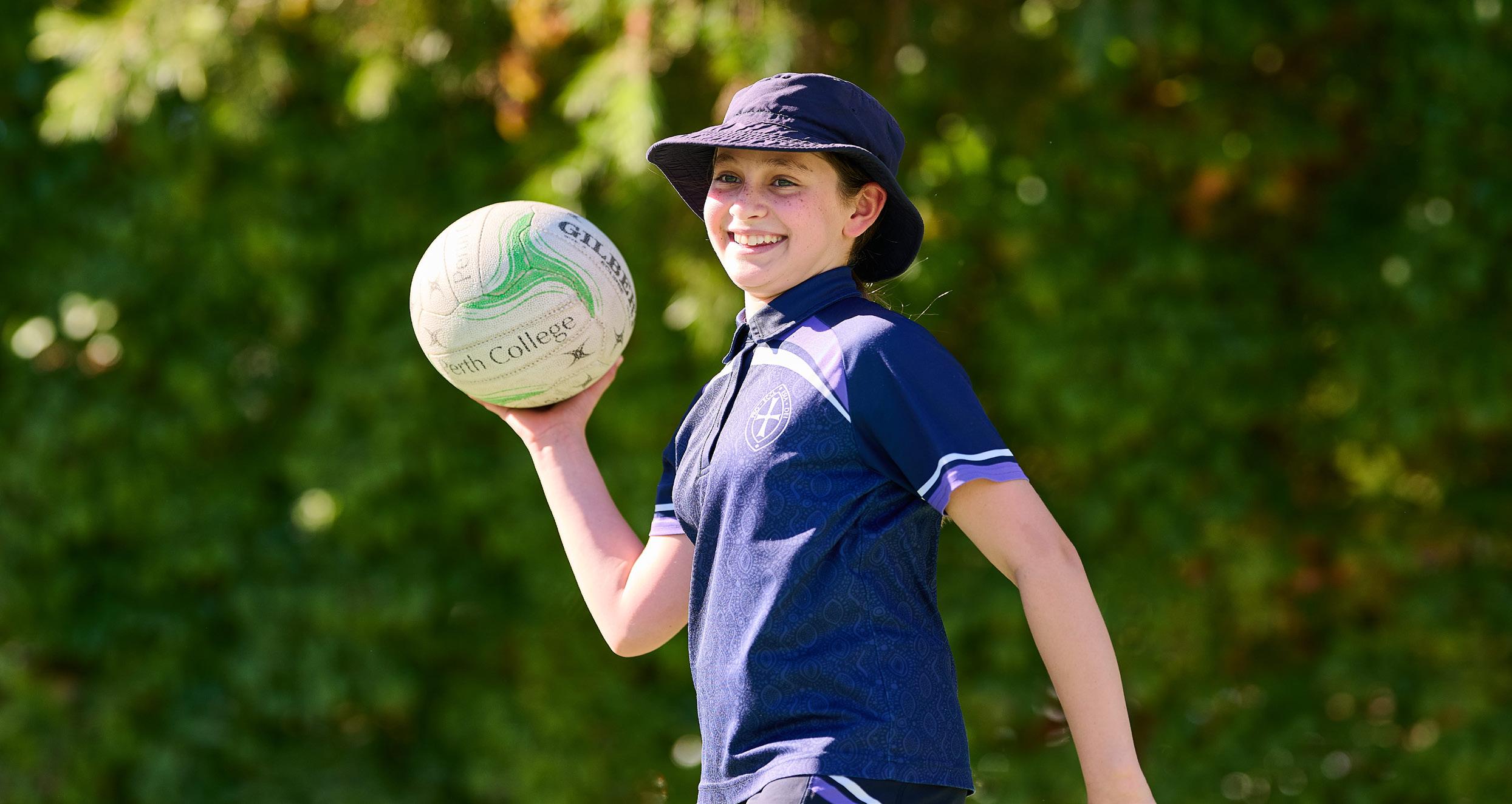
Year 11 to 12



Year 11 to 12

Selecting your pathway must always require two things knowledge and self-awareness.
Years 11 and Year 12 represent a new and exciting phase of schooling. These two years lay the foundation and create pathways to further learning beyond Perth College.
In these years, we see you as young adults capable of making choices and taking responsibility for your learning. You can shape your pathway into a future that meets your interests and aspirations, and you will have all the opportunities that come with being a senior Perth College student.

Selecting your courses for Years 11 and 12 requires an understanding of the criteria for achieving the Western Australian Certificate of Education, as well as the requirements of Technical and Further Education (TAFE) or University entrance.
You will need to do your homework - post-school destinations can have entry requirements and this should guide your study pathway and the suite of subjects you choose.
There is a wide world of opportunity beyond school and study, and you also should continue thinking, researching, talking and dreaming about what you will do with your life and how you will contribute to the world.
There is a lot of assumption circulating about subjects and pathways. You may feel pressured to choose what everyone else is choosing, or what your parents or siblings chose, or what used to be the traditional pathway to get somewhere. All this knowledge and planning needs to be placed within the framework of YOU - your interests and your aspirations balanced against a realistic assessment of your strengths and personal challenges.
Listen to all the advice, but keep an open mind.
Realistically evaluate your abilities and interests and make sure you have the most up-to-date information.
Check all the options and explore all the possibilities.
Keep flexibility as your guiding principle.
Then decide.
The program of study you choose should be designed to excite you, play to your strengths and maximise your options, while also challenging you to be the best you can be.
If you have chosen your subjects well for Year 11 and worked consistently, you should be able to follow the same pathway into Year 12 and have a successful year.
‘Success’ for you as a student means achieving a minimum of solid C grades, as well as passing examination results. You might need to adjust your program if you do not meet these criteria to ensure you keep progressing towards achieving the WACE.
It is very important to choose well in Year 10 because, while changes are possible in Year 11 and 12, all adjustments to learning programs are subject to approval and availability on the timetable.
Year 13 is an option for all students, whereby Years 11 and Year 12 are completed over 3 years. The reasoning for this option may vary, from academic capacity, external commitments or mental health. Students interested in this option are requested to speak with the Director of Learning and Teaching. The selection may be enacted at various stages in Years 11 or Year 12, to permit flexibility in its use and support at point of need.
You probably have lots of questions about courses for Year 11 and Year 12.
Some key questions you might have are:
• Do all courses have examinations?
• Why is an English course compulsory?
What do I need to know about ATAR Examinations and Externally Set Tasks?
• What about scaling?
• What does the mark bonus for courses mean?
• Why would I study a course that challenges me?
• What do I do if I want to change subjects?
• How do I enrol in a language ATAR course?
• What awards does SCSA offer?
CLICK HERE for answers

Achievement of the Western Australian Certificate of Education (WACE) acknowledges that, at the end of compulsory schooling, you have achieved or exceeded the required minimum standards in an educational program that has suitable breadth and depth. You must fulfill a set of criteria to achieve the WACE.
Some key questions you might have are:
What are the requirements to receive a WACE?
• Literacy and Numeracy Standard
• Breadth and Depth
• Achievement Standard
• How is a WASSA different from a WACE?
• Why do I need a WACE? Isn’t an ATAR more important?
CLICK HERE for answers
An ATAR reports your rank position relative to all other students, and ranges from zero to 99.95. It takes into account the number of students who sit the ATAR course examinations in any year, and also the number of people of Year 12 school leaving age in the total population.
For example, if you have an ATAR of 70.00, it indicates that you’ve achieved as well as, or better than, 70% of the Year 12 school leaver age population in the state.
The ATAR allows the results of any WA student applying for university admission interstate to be directly compared with results in other states. Most states report student rankings as an ATAR.
You need at least four scaled scores for an ATAR to be calculated. The ATAR is calculated from your Tertiary Entrance Aggregate (TEA).
Some key questions you might have are:
• Do I need an ATAR?
• How is an ATAR calculated?
• What is the Tertiary Entrance Aggregate?
CLICK HERE for answers

HOW CAN I FIND OUT ABOUT TISC, University, TAFE and careers?
The links below will take you to the SPACE Careers page and the TISC website - both of which provide you with the most updated information from tertiary providers and industry. Here you can consider your options, read about course admission requirements and get the latest career advice.
Both links take you outside this document and you will need to navigate back to this handbook.
CLICK HERE for SPACE Careers page CLICK HERE for TISC Information
For course selection, WACE requirements or help with a pathway decision:
Heather Gardiner Head of Careers & VET heather.gardiner@pc.wa.edu.au
Shona Hall Associate Director of Analytics and Academic Services shona.hall@pc.wa.edu.au
Nicole Blyth Director of Learning and Teaching nicole.blyth@pc.wa.edu.au
For help with being a senior student, the wellbeing team including your Head of Year and the Director of Wellbeing are here to support you.
Demonstrate a minimum standard of literacy (reading and writing) and a minimum standard of numeracy.
• Complete a minimum of 20 units (or equivalents)
• Complete
• four or more Year 12 ATAR courses, or;
• at least five Year 12 General courses and/or ATAR courses or equivalent, or;
• a Certificate II (or higher) VET qualification in combination with ATAR, General or Foundation courses.
• NB: The term complete requires a student to sit the ATAR course examination/s.
For the WACE literacy and numeracy standard you may:
• Pre-qualify through the reading, writing and numeracy tests of the Year 9 National Assessment Program - Literacy and Numeracy (NAPLAN), or;
• Demonstrate the minimum standard of literacy and numeracy by successfully completing the relevant components of the Online Literacy and Numeracy Assessment (OLNA) in Year 10, 11 or 12.
The requirement to complete a minimum of 20 course units (which may include unit equivalents attained through VET and/or endorsed programs) must include at least:
• A minimum of 10 Year 12 units, or the equivalent Four units from an English course, post-Year 10, including at least one pair of Year 12 units from an English learning area course
• One pair of Year 12 units from each of List A (Arts /Languages/Social Sciences) and List B (Mathematics/Science/Technology) subjects
You are required to achieve at least 14 C grades (or equivalents) in Year 11 and Year 12 units, including at least six C grades (or equivalents) in Year 12 units.
Unit equvalence can be obtained through VET qualifications undertaken as VET credit transfer and/or endorsed programs. The maximimum unit equivalence available is eight units - four Year 11 units and four Year 12 units. You can find this information (and more) on the ‘WACE Requirements’ page of the SCHOOL CURRICULUM STANDARDS AUTHORITY (SCSA) WEBSITE.
The Western Australian Statement of Student Achievement (WASSA) is an overall summary of your achievement. It will list the achievement levels in both WACE examinations and school assessments for each course. It will also list any other achievements such as awards, exhibitions, SCSA-endorsed programs, VET qualifications and community service hours.
The WACE is the qualification that recognises that you have completed all the requirements for secondary graduation. It is the springboard to learning beyond school - not achieving the WACE makes the next step much harder.
The ATAR rank is a calculation used to offer places for university admission. Accessing university is possible without an ATAR as there are quite a few alternative entries, however, having a WACE is essential.
The answer is both yes and no...
The ATAR is used to rank students and offer places for university admission. It is the most direct way to access and attend university after school. If studying four or more ATAR courses is going to be a successful formula for you, it is a good way to keep your post-school options open.
You really need an ATAR for highly competitive courses like Medicine, or academic disciplines like Engineering or Law. Other courses are often much more flexible which is why we encourage you to be flexible too.
It is important to know that, in recent years, fewer than 30% of students who gained entry to university did so via an ATAR. The majority of students used alternative pathways such as a VET award course, a preparation course, a portfolio entry or mature age entry.
Studying an ATAR pathway where you struggle though Year 11 and Year 12 can leave you with an ATAR less than the minimum needed to be offered a place at university (in 2024 this was 70). Further, it can place you at risk of not meeting the minimum requirements of the WACE Achievement Standard and then your post-school options narrow significantly.
Choosing your best pathway through Years 11 and 12 is dependent on knowing the different ways to get where you want to go, and being open minded enough to evaluate your best option. An example might be thinking about English because a scaled score of 50 in an English ATAR course is required for entry to all WA Universities. Can you achieve this?
If you are not sure, there are other options.
You can see that the simple question “Do I need an ATAR” is made more complex when you adopt a fixed mindset. We try to see you through a strength-based lens and the people creating options for you beyond school operate from a model that focuses on inclusion and opportunity. We encourage you to also consciously adopt a growth mindset as you decide whether working towards an ATAR is the best pathway for you.
At the end of Year 12 all ATAR courses completed will be given a grade and a mark. This mark is the result of every assessment completed in the course. This mark contributes to 50% of the final mark, while the other 50% comes from a student’s performance in the ATAR course examinations in November of Year 12. This combined mark is subject to a variety of statistical processes to become the final scaled mark for the course.
The following are the processes used:
• Moderation : marks are adjusted for differences in assessment from school to school.
• Standardisation : marks are adjusted for differences in difficulty of examination papers from year to year.
• Scaling : marks are adjusted for differences in difficulty from course to course. Scaling ensures you are not disadvantaged by taking a difficult subject.
The ATAR ranges between zero and 99.95. It reports your rank relative to all other WA students of Year 12 school leaving age, and takes into account the number of students with a Tertiary Entrance Aggregate (TEA), as well as the number of people of Year 12 school leaving age in the population of WA. The ATAR is derived from the TEA, which is calculated by adding the best four scaled scores (the maximum TEA is 430).

Your Tertiary Entrance Aggregate (TEA) is the sum of your best four scaled scores plus 10% of your best Language Other Than English (LOTE) scaled score (if you have one), plus 10% of your Mathematics: Methods ATAR scaled score (if you have one), plus 10% of your Mathematics: Specialist ATAR scaled score (if you have one). These are based on the following rules:
• You can accumulate the scaled scores which contribute to your TEA over five consecutive years, but you can only count any subject or course once. If you repeat a course, we use your best score in that course.
• There are some unacceptable course combinations (check the admission requirements for your year). For these combinations, scores in both courses cannot be used and the best score from the combination will be used.
• If you have a scaled score in a Language Other Than English, 10% of your LOTE scaled score is added to the aggregate of your best four scaled scores. LOTE scaled scores must be from the current year, or the previous four years. If you have more than one LOTE score, only the best LOTE scaled score will be used as the LOTE bonus. You receive the LOTE bonus even if your LOTE course wasn’t one of your counted as one of your best four.
• If you have a scaled score in Mathematics Methods ATAR and/or Mathematics Specialist ATAR, 10% of your scaled score/s in these subjects will be added to your Tertiary Entrance Aggregate. You will receive this Mathematics bonus even if the course/s aren’t in your best four.
• The maximum TEA is 430.
Your TEA will be calculated and then converted to an ATAR, which tells you where you’re ranked relative to other students.
TISC will then construct a table to convert your TEA to an ATAR. This table is constructed annually. In this case the ATAR is approximately 91.00 (based on 2023 data) and this means that this student has achieved better than 91% of the population of students who sat (or could have sat) ATAR course examinations.
When considering subject requests, it is important to note the following:
• Areas of interest - students are much more likely to succeed in courses which cover the kind of subject matter they find interesting.
• Abilities and achievements - students are more likely to achieve well in subjects within their range of abilities.
• Post-school intentions - University, TAFE or elsewhere? It is important to have a reasonable set of expectations about courses and their requirements.
All students must select six courses and one of these courses must be an English course. The suite of courses must meet the requirements for the award of the WACE.
This Curriculum Handbook offers:
• Course overviews
• Films that give you access to the voice of students who are doing the course, or who did the course in recent years
• Links to the SCSA syllabus for each course
This term, you have had a chance to learn about the different pathways in preparation for Year 11. The Year 10 Pathway Planning Meetings, also scheduled for the final weeks of Term Two, is where you can discuss your achievement thus far and look towards future options. You can also book a longer meeting time with a course counsellor to discuss your pathway further.
The selection of courses for Years 11 and 12 requires careful negotiation as post-secondary options in education and training need to be considered, as well as the criteria for achieving the WACE and the requirements of TAFE or University entrance.
The rules and regulations of SCSA, the prerequisites demanded by various post-secondary courses and the interests of the individual must all be balanced to arrive at a program that meets the needs and maximises the options of each student.
The framework for making decisions about courses for study in Years 11 and 12 should be the abilities, achievements and interests of the student, balanced against future career aspirations. As such, it is important that a realistic assessment of capabilities, work practices and career options underpins the selection process.
• Not all subjects are equal - some require higher levels of critical thinking, some have the expectation that you have skills and knowledge from earlier years of study, and some are quite specialist in themselves.
• The best way to choose a suite of subjects is by asking yourself “what am I good at?” and “what ignites my interest?” and “what will build my capacity for the future I plan?”
• Your subject teachers will give you recommendations and advice. You should listen to them as they know you and they know what it takes to do well in a subject.
University prerequisite and desired subjects should be considered carefully alongside your future career aspirations
• There are different pathways and avenues to get to university.
• Each year the timetable is built around your collective choices as a year group and it can be hard to make changes in Year 11 if you find a subject too difficult, or just not what you expected. Choose realistically and wisely now so that you have a smooth and successful pathway. Subject changes are not always possible and may require changes to multiple classes depending on class sizes and the nature of the grid.
• There may be subjects you are interested in studying but are unsure about, in which case you should speak to the Head of Learning Area, Learning Area Co-ordinator or a specialist teacher. This is especially important for HASS and Science where the rotations you have completed might not have given you enough information at this point in time, and also for Mathematics where your achievement in the course you are currently studying creates logical pathways into different courses. Your English teacher will also advise you about different courses and where you might experience the greatest success.
All students study six courses:
• An English course - English ATAR, English as an Additional Language/Dialect ATAR, Literature ATAR or English General
• Five other courses drawn from:
• List A courses (Arts/Languages/Social Sciences)
• List B Courses (Mathematics/Science/Technology)
• VET certificates
Compulsory subjects are:
• Philosophy and Ethics ATAR Unit 1 or Religion and Life General Unit 1
• Wellness Options
All students study five or six courses:
• An English course - English ATAR, English as an Additional Language/Dialect ATAR, Literature ATAR or English General
• Four or five other courses drawn from:
• List A courses (Arts/Languages/Social Sciences)
• List B Courses (Mathematics/Science/Technology)
• VET certificates
• Students may elect to have Independent Learning time if studying three or more ATAR subjects
Compulsory subjects are:
• Beliefs and Values
• Wellness Options
You have lots of choice when designing your pathway into Years 11 and 12. You can choose any combination of subjects from ATAR, General or VET, as long as you study the minimum number of subjects and meet the requirement to achieve the WACE and the pathway you choose.
ATAR pathway
If you are aiming for direct entry to university you would study five to six ATAR courses in Years 11 and 12, as well as one or two General or VET courses.
If you are aiming for university entry through alternative entry processes (portfolio, University Preparation Course (UPC) or Certificate IV), but keeping your options open for TAFE and VET, choose two to three ATAR courses, including English, and two to three General and VET courses.

If you are interested in VET and Workplace Learning and you are seeking employment or further training at the end of Year 12, choose mainly General and VET courses.
• University is the only pathway to a sustainable career
• Apprenticeships and traineeships don’t offer the same financial opportunities as other pathways
VET is too hard physically
As parents, how many times have you thought or heard these statements?
Among the Australian public, perceptions surrounding VET continue to be out of step with the reality of the sector and its achievements. A report developed by the Skilling Australia Foundation and McCrindle Research provides information on the myths and realities that you should be aware of. You can access the report HERE
The Australian Apprenticehips and Traineeships Information service (AATIS) have debunked these and other common myths around VET Pathways in this blog post. Mark Dean, Research and Data Officer at AATIS who has researched industry 4.0 and the future of work talks about how VET Pathways are a sustainable career choice of the future, and the various benefits of embarking on one. Read the complete post HERE.
You might also be interested in the YouthSense report called “After the ATAR III” which looks at the passions of young people and what they really want to do in their world beyond school. You can access that report via THIS LINK
The Australian Apprenticeships and Traineeships Information Service (AATIS) offers pathway information to students, job hunters, career advisors and employers. Their Australian Apprenticeships website, app and resources are used and recommended by schools, parents, friends and other career-influencers. To learn more, visit their WEBSITE.
At least one subject from List A must be selected.
ENGLISH AS AN ADDITIONAL LANGUAGE/ DIALECT ATAR (AEELD)
✓
ENGLISH ATAR (AEENG) ✓
ENGLISH GENERAL (GEENG)
LITERATURE ATAR (AELIT) ✓
BUSINESS MANAGEMENT AND ENTERPRISE GENERAL (GEBME)
CHINESE: SECOND LANGUAGE ATAR (AECSL) ✓
DANCE ATAR (AEDAN) ✓
ENGLISH AS AN ADDITIONAL LANGUAGE/ DIALECT ATAR (ATELD)
Please note that the availability of subjects is determined by a minimum number of students electing to do them. Insufficient numbers may mean that some subjects will not be offered.
DRAMA ATAR (AEDRA) ✓
ECONOMICS ATAR (AEECO) ✓
FRENCH: SECOND LANGUAGE ATAR (AEFSL) ✓
GEOGRAPHY ATAR (AEGEO) ✓
Strict enrolment requirements are essential for this subject. Seek advice from Head of Learning Engagement for EALD English.
ENGLISH ATAR (ATENG) High C grade in Year 10 English. OLNA Reading and Writing achieved.
ENGLISH GENERAL (GTENG) No prior study in a particular course required.
LITERATURE ATAR (ATLIT) B grade in Year 10 English. OLNA Reading and Writing achieved.
BUSINESS MANAGEMENT AND ENTERPRISE GENERAL (GTBME)
CHINESE: SECOND LANGUAGE ATAR (ATCSL)
No prior study in a particular course required.
C grade in Year 10 Chinese.
DANCE ATAR (ATDAN) If studied Year 10 Dance: B grade in Year 10 Dance, High C grade in Year 10 English.
If not studied Year 10 Dance: Discussion with the Co-ordinator of Dance and Drama, High C grade in English.
DRAMA ATAR (ATDRA) If studied Year 10 Drama: B grade in Year 10 Drama, High C grade in Year 10 English.
If not studied Year 10 Drama: Discussion with the Co-ordinator of Dance and Drama, High C grade in English.
ECONOMICS ATAR (ATECO) B grade in Year 10 HASS.
FRENCH: SECOND LANGUAGE ATAR (ATFSL)
C grade in Year 10 French.
GEOGRAPHY ATAR (ATGEO) High C grade in Year 10 HASS.
MODERN HISTORY ATAR (AEHIM) ✓ MODERN HISTORY ATAR (ATHIM) High C grade in Year 10 HASS.
MUSIC ATAR (AEMUS) ✓
MUSIC ATAR (ATMUS) Complete Music units in Years 9 and 10 or with approval from from the Head of The Arts.
POLITICS AND LAW ATAR (AEPAL) ✓ POLITICS AND LAW ATAR (ATPAL) High C grade in Year 10 HASS.
VISUAL ARTS ATAR (AEVAR) ✓
VISUAL ARTS GENERAL (GEVAR)
VISUAL ARTS ATAR (ATVAR) B grade in Art units in Year 9 or Year 10 and High C grade in Year 10 English.
VISUAL ARTS GENERAL (GTVAR)
No prior study in a particular course required.
At least one subject from List B must be selected.
YEAR 11 ATAR SCORING YEAR 12
ACCOUNTING AND FINANCE ATAR (AEACF)
APPLIED INFORMATION TECHNOLOGY ATAR (AEAIT)
✓
✓
BIOLOGY ATAR (AEBLY) ✓
CHEMISTRY ATAR (AECHE) ✓
DESIGN: PHOTOGRAPHY GENERAL (GEDESP)
FOOD SCIENCE AND TECHNOLOGY GENERAL (GEFST)
HUMAN BIOLOGY ATAR (AEHBY)
MATERIALS DESIGN AND TECHNOLOGY GENERAL (GEMDTT)
MATHEMATICS APPLICATIONS ATAR (AEMAA)
MATHEMATICS ESSENTIAL GENERAL (GEMAE)
MATHEMATICS METHODS ATAR (AEMAM)
MATHEMATICS SPECIALIST ATAR (AEMAS)
PHYSICAL EDUCATION STUDIES ATAR (AEPES)
PHYSICS ATAR (AEPHY)
PSYCHOLOGY ATAR (AEPSY)
✓
ACCOUNTING AND FINANCE ATAR (ATACF)
APPLIED INFORMATION TECHNOLOGY ATAR (ATAIT)
BIOLOGY ATAR (ATBLY)
MINIMUM PREREQUISITE
C grade in Year 10 HASS and C grade in Year 10 Mathematics Course 2
C in English
High C grade in Band 1 Biological, Space and Earth Sciences or
A grade in Band 2 Biological, Space and Earth Sciences.
CHEMISTRY ATAR (ATCHE) B grade in Band 1 Physical Sciences.
DESIGN: PHOTOGRAPHY GENERAL (GTDESP)
FOOD SCIENCE AND TECHNOLOGY GENERAL (GTFST)
HUMAN BIOLOGY ATAR (ATHBY)
MATERIALS DESIGN AND TECHNOLOGY GENERAL (GTMDTT)
✓
✓
✓
✓
MATHEMATICS APPLICATIONS ATAR (ATMAA)
No prior study in a particular course required.
No prior study in a particular course required.
High C grade in Band 1 Biological, Space and Earth Sciences or A grade in Band 2 Biological, Space and Earth Sciences
No prior study in a particular course required.
C grade in Mathematics Course 2. OLNA achieved in Numeracy.
MATHEMATICS ESSENTIAL GENERAL (GTMAE) C grade in Year 10 Essential Mathematics.
MATHEMATICS METHODS ATAR (ATMAM)
B grade in Year 10 Mathematics Course 1 OLNA achieved in Numeracy.
MATHEMATICS SPECIALIST ATAR (ATMAS) A grade in Year 10 Mathematics Course 1
PHYSICAL EDUCATION STUDIES ATAR (ATPES)
OLNA achieved in Numeracy.
High C grade in Year 10 English and High C grade in Band 1 Biological, Space and Earth Sciences or A grade in Band 2 Biological, Space and Earth Sciences.
✓ PHYSICS ATAR (ATPHY) B grade in Band 1 Physical Sciences.
✓
PSYCHOLOGY GENERAL (GEPSY)
PSYCHOLOGY ATAR (ATPSY)
PSYCHOLOGY GENERAL (GTPSY)
High C grade in Band 1 Biological, Space and Earth Sciences or A grade in Band 2 Biological, Space and Earth Sciences
No prior study in a particular course required.
REQUIREMENTS
Your course of study needs to have at least one subject from Li st A and at least one subject from List B.
LIST A
ARTS, LANGUAGE AND SOCIAL SCIENCES
ENGLISH AS AN ADDITIONAL LANGUAGE/DIALECT
ATAR
THIS COURSE CAN ONLY BE CHOSEN BY THOSE STUDENTS WHO MEET STRICT LANGUAGE REQUIREMENTS.
ENGLISH ATAR
LITERATURE ATAR
ENGLISH GENERAL
BUSINESS MANAGEMENT AND ENTERPRISE GENERAL
CHINESE: SECOND LANGUAGE ATAR
DANCE ATAR
DRAMA ATAR
ECONOMICS ATAR
FRENCH: SECOND LANGUAGE ATAR
GEOGRAPHY ATAR
MODERN HISTORY ATAR
MUSIC ATAR
POLITICS AND LAW ATAR
VISUAL ARTS ATAR
VISUAL ARTS GENERAL
At Perth College, a bespoke timetable grid is designed each year in response to student course requests, ensuring the best possible outcome for the majority of students following initial course counselling with Heads of Department. In some cases, where course combinations
LIST B
MATHEMATICS, SCIENCE AND TECHNOLOGY
ACCOUNTING AND FINANCE ATAR
APPLIED INFORMATION TECHNOLOGY ATAR
BIOLOGY ATAR
CHEMISTRY ATAR
DESIGN: PHOTOGRAPHY GENERAL
FOOD SCIENCE AND TECHNOLOGY GENERAL
HUMAN BIOLOGY ATAR
MATERIALS DESIGN AND TECHNOLOGY GENERAL
MATHEMATICS APPLICATIONS ATAR
MATHEMATICS ESSENTIAL GENERAL
MATHEMATICS METHODS ATAR
MATHEMATICS SPECIALIST ATAR
PHYSICAL EDUCATION STUDIES ATAR
PHYSICS ATAR
PSYCHOLOGY ATAR
PSYCHOLOGY GENERAL
cannot be accommodated within the grid, students may need to consider alternative options—such as enrolling in a course through the School of Isolated and Distance Education or selecting an alternative subject that aligns with the final timetable.
You can choose to study a VET certificate as one of your Year 11 subjects:
• VET: Certificate II in Sport and Recreation (SIS 20122)
• VET: Certificate II in Workplace Skills (BSB 20120)
These courses are provided by IVET (RTO: 40548) and delivered by a Perth College teacher as a class in your timetable.
In addition to your selection from the subjects above, you are required to participate in the following courses as part of your program:
Philosophy and Ethics
An accredited SCSA Course that contributes one unit towards your WACE.
You will choose one of the following:
• Philosophy and Ethics ATAR (Unit 1)
• Religion and Life General (Unit 1)
You can select from courses including Senior First Aid, Bronze Medallion Requalification, Group Fitness, Self Defence, Power Stretch, Rock Climbing, Tenpin Bowling, Walk and Talk, Weights and Fitness and Games.
InsideOut is a sequential self-leadership program designed specifically for Perth College students. Based on the principles of positive psychology, the program’s philosophy is that inner development leads to outer excellence. InsideOut provides a framework and various learning opportunities outside the classroom which develop your resilience and leadership capacities.

In Year 12, all students must study an English courseEnglish as an Additional Language/Dialect ATAR, English ATAR, English General or Literature ATAR
REQUIREMENTS
Your course of study needs to have at least one subject from Li st A and at least one subject from List B.
LIST A
ARTS, LANGUAGE AND SOCIAL SCIENCES
BUSINESS MANAGEMENT AND ENTERPRISE GENERAL
ENGLISH AS AN ADDITIONAL LANGUAGE/DIALECT ATAR
THIS COURSE CAN ONLY BE CHOSEN BY THOSE STUDENTS WHO MEET STRICT LANGUAGE REQUIREMENTS.
ENGLISH ATAR
ENGLISH GENERAL
LITERATURE ATAR
CHINESE: SECOND LANGUAGE ATAR
DANCE ATAR
DRAMA ATAR
ECONOMICS ATAR
FRENCH: SECOND LANGUAGE ATAR
GEOGRAPHY ATAR
MODERN HISTORY ATAR
MUSIC ATAR
POLITICS AND LAW ATAR
VISUAL ARTS ATAR
VISUAL ARTS GENERAL
LIST B
MATHEMATICS, SCIENCE AND TECHNOLOGY
ACCOUNTING AND FINANCE ATAR
APPLIED INFORMATION TECHNOLOGY
BIOLOGY ATAR
CHEMISTRY ATAR
DESIGN: PHOTOGRAPHY GENERAL
FOOD SCIENCE AND TECHNOLOGY GENERAL
HUMAN BIOLOGY ATAR
MATERIALS DESIGN AND TECHNOLOGY GENERAL
MATHEMATICS APPLICATIONS ATAR
MATHEMATICS ESSENTIAL GENERAL
MATHEMATICS METHODS ATAR
MATHEMATICS SPECIALIST ATAR
PHYSICAL EDUCATION STUDIES ATAR
PHYSICS ATAR
PSYCHOLOGY ATAR
PSYCHOLOGY GENERAL
In a world where technical knowledge is continually changing, employability skills are vital for everyoneregardless of age or experience. These skills are developed over the lifetime of an individual and are valued in further education, training, workplaces and community environments.
The VET program at Perth College is available to all students. Its structure depends on the pathway selected by students and their interests and capabilities. Qualifications achieved are nationally accredited and add substance to a curriculum vitae in a world of work that values flexibility, diversity and agility in thinking.
All students can select VET as a subject in Year 11. The Certificate II in Sport Coaching (SIS 20321) and the Certificate II in Workplace Skills (BSB 20120) are offered as subjects within the timetable. Students complete units of competency with a teacher or facilitator for direction and support. These VET certificates are nationally accredited qualifications and provide credit towards the WACE (two unit equivalents in Year 11 and two extra unit equivalents in Year 12).
While all students can elect to complete a VET certificate in Year 11, VET in Year 12 is generally restricted to students studying fewer than four ATAR courses, and is subject to the achievement of satisfactory results in Year 11 VET.
Additional VET qualifications can be obtained at Certificate II, III or IV level. The choice is tailored to the needs and aspirations of each student and a wide variety of options are possible including online or off-campus learning at a Registered Training Organisation (RTO).
You can access university entrance through the preparation programs offered at most tertiary institutions. These programs are designed to position you to be university ready and are generally six months in duration. On completion of a preparation program, you could begin your university studies in the next semester intake.
Further study at TAFE
Completing a VET certificate gives you the option of building your career-ready capacity through a range of flexible study options at TAFE. You can move directly to Certificate IV or Diploma level courses, from which you could then progress into a Bachelor Degree at a university.
Work opportunities
VET Certificates also ensure that you are work ready and allow you direct access to a wide range of occupations in a full-time, part-time or casual capacity.
Co-Payment Support
Perth College supports students to complete VET courses as well as standard year level subjects because we believe this provides a wider range of educational options.
The School offers a subsidy of up to $1000 for VET courses in keeping with our policy of supporting individualised programs for Year 11 and 12 students. This is a co-payment arrangement with the family of the student, who enters a VET contract with the School at the beginning of the course.

An endorsed program is a significant learning program that has been developed by the School, a community organisation, or a private provider, and has been endorsed by SCSA.
These programs can contribute to the WACE Completion of Units requirement. Endorsed programs that originate from Perth College will automatically be included on your statement (eg Duke of Edinburgh awards or AMEB music qualifications). You also have the opportunity to present evidence of other programs completed outside of Perth College.
CLICK HERE for information on the full range of endorsed programs available.
Workplace Learning is a SCSA-developed endorsed program that is managed by the School and open to students in Years 11 and 12. At Perth College, workplace learning is compulsory for students studying fewer than three ATAR courses. It is individually tailored and is generally completed in the school holidays or examination periods.
To complete this endorsed program, you will work in one or more real workplaces to develop a set of transferable workplace skills. You record the number of hours completed and the tasks undertaken in the workplace in a Workplace Learning Logbook provided by SCSA.
You also provide evidence of knowledge and understanding of the workplace skills by completing a Learning Skills Journal after each 55 hours completed in the workplace. The total number of hours completed in the workplace is reported on the student’s Western Australian Statement of Student Achievement (WASSA).
You can use VET qualifications and endorsed programs (including Workplace Learning) in the place of SCSA courses to meet the Achievement Standard that is part of the award of the WACE.
The maximum number of unit equivalents available through VET qualifications is eight (four Year 11 units and four Year 12 units). The maximum number of unit equivalents available through endorsed programs is four (two in Year 11 and two in Year 12).
Unit equivalence in Workplace Learning is allocated based on one unit equivalent for each 55 hours completed in the workplace, to a maximum of four units.
All ATAR courses have compulsory external examinations at the end of Year 12. This is independent of any desire to gain university entrance. The final mark for each course in Year 12 is calculated with 50% from the external examination and 50% from your school assessment.
All General courses have a compulsory common task called an Externally Set Task (EST) that all students enrolled in a General course and a Foundation course complete in Semester One of Year 12. The task is set by the SCSA, completed by students under test conditions, and accounts for 15% of the final mark for that pair of units.
Students intending to proceed to university, or who wish to keep that option open, must also achieve a satisfactory level in an English as an Additional Language/Dialect, English or Literature ATAR course. This requirement differs from university to university but is usually a minimum achievement of a scaled mark of 50. More detailed information can be obtained from the TISC website and the TISC brochure.
The purpose of scaling marks in ATAR courses is to put all the results onto a common scale so the best four results can be added to produce a Tertiary Entrance Aggregate (TEA), and hence an Australian Tertiary Admission Rank (ATAR). When selecting your subjects for Years 11 and 12, you should not choose based on things you have heard or read about scaling, as these are generally misinformed. The reality is no matter how a subject is scaled, if you do not perform well in that subject, then scaling will not help.
Rather, consider the following:
Do you find the subject interesting or do you enjoy the subject? Do you clearly understand what the subject involves?
Is the subject one in which I can do well if I work consistently? If this subject is a stretch for me, is it one that I need for my pathway or one that is really important to me?
CLICK HERE for more information.
Some subjects receive ‘bonus points’ which means that 10% of your final scaled score/s in these courses will be added to your TEA, from which your ATAR is derived. These subjects include Languages, Mathematics Specialist and Mathematics Methods.
Do consider carefully, though - choosing to study a subject just because it offers bonus points is not wise. You would want to choose a subject because you enjoy it and it suits your ability.
This is all about playing to your strengths and using these to your advantage.
• You might study Dance because you are already proficient in the physical discipline and are passionate about learning more about the theory and choreography of Dance.
You might study Literature because you are strong at analysis and are already a proficient reader.
• You might study Economics because the interplay between money, resources and politics really excites you.
This is playing to your strengths.
Then there are courses which many people categorise as ‘hard’, but which in reality require a different capacity for thinking or a background of learning that provides a springboard for success.
• If you are a student who loves STEM subjects, or is looking for a challenging branch of Mathematics not seen in Years 7 to 10, then Specialist Mathematics can create opportunities that can launch you into exciting career pathways.
• If you are a ‘big picture’ visual learner and you love to logically question the world around you, then Physics may be your thing. Physics is not just all about maths - it is the fundamental subject that underpins all of science.
Again, studying these subjects might play to your strengths.
Categorising any subject as ‘hard’ or ‘challenging’ is really limiting. Every subject is a challenging and exciting subject if it stretches you academically in just the right ways, plays to your strengths and bridges you from school to the world beyond.

If you wish to study an ATAR language course, you need to complete an application for permission in the year prior to first enrolment in the course. This seeks to ensure that you select the course best suited to your linguistic background and educational needs.
This is awarded for excellence to the student who achieves the top WACE award score (used to rank students for General Exhibitions). The WACE award score is based on the average of five equated examination scores in ATAR courses, calculated to two decimal places. At least two of the examination scores must be from each of List A and List B subjects. Where an examination includes both written and practical components, an appropriate statistical process will be used to combine the examination marks.
This is awarded for excellence to the student who has demonstrated the most oustanding overall performance in a VET Certificate II or higher, and in their other WACE subjects. Students eligible for this award will have:
• Achieved a WACE, and
Achieved a VET exhibition in one of the industry area
General Exhibition
General Exhibitions are awarded to the top 50 students who obtain the highest WACE award scores. General Exhibitions recognise outstanding academic achievement in Year 12 ATAR courses with examinations set by SCSA.
Awarded to the eligible student obtaining the highest examination mark for each Year 12 ATAR course with an examination set by the Authority, provided that at least 100 candidates sat the examination. To be eligible for a Subject Exhibition, the student must have completed the pair of Year 12 units in the course in the year of the award and have not preiously sat the ATAR course examination for that course.
Awarded to eligible candidates who are in the top 0.5 per cent of candidates in each ATAR course examination set by the Authority, based on the examination score, or the top two candidates (whichever is the greater) in a course where at least 100 candidates sit the ATAR course examination. The number of Certificates of Excellence issued for each subject is based on the number of candidates who sit the ATAR course examination. Where a subject includes both written and practical components the examination score will be determined using an appropriate statistical process to combine the two examination scores. To be eligible for a Certificate of Excellence, the student must have completed the pair of Year 12 units in the course in the year of the award and have not previously sat the ATAR course examination for that course.
These certificates recognise student WACE achievement and are dependent on the degree of difficulty of the courses and programs undertaken, and the student’s achievement in those courses and programs. The awards are based on the grades achieved by each student in school. A Certificate of Merit or a Certificate of Distinction is to be awarded to each eligible student who, in their last three consecutive years of senior secondary school WACE enrolment, accumulates 150-189 points (Certificate of Merit) or 190-200 points (Certificate of Distinction).
For more infromation, visit Section 8 of the WACE manual.
CLICK HERE for more information.